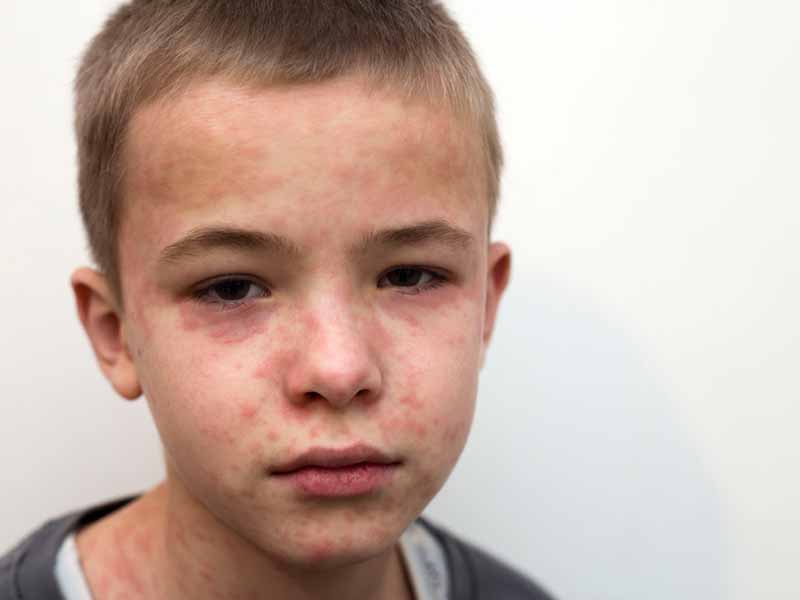Global Group Warns COVID-19 May Hinder Measles Vaccination
New AAFP Resources Guide FPs on Immunizations
April 24, 2020 09:37 am News Staff – As the numbers of COVID-19 cases and fatalities continue to climb, some health organizations have already started thinking about the pandemic's effects on efforts to curb the spread of other infectious diseases.

Take, for example, the Measles & Rubella Initiative, a global partnership founded by the CDC, the World Health Organization and other groups that is committed to stopping the spread of measles and rubella outbreaks. On April 14, the initiative released a statement that indicated the COVID-19 pandemic could result in the suspension or postponement of dozens of measles immunization campaigns worldwide, potentially leaving more than 117 million children around the globe at risk of missing important measles vaccinations.
"The pandemic sweeping the globe requires a coordinated effort and commitment of resources to ensure front-line health workers around the world are protected as they face and respond to this new threat," the initiative said in its statement. "At the same time, we must also champion efforts to protect essential immunization services, now and for the future."
Group's Statement References WHO Guidance
In its statement, the initiative pointed to interim guidance the WHO issued in March that states immunization is a core health service that should be prioritized to prevent communicable diseases and that immunization services should continue to be provided wherever they can be performed safely.
n areas with a high risk of COVID-19 transmission, the guidance recommends that governments weigh the risks and benefits of delaying routine mass immunization campaigns and consider postponing those campaigns if necessary. The guidance also recommends that governments temporarily pause preventive immunization campaigns in the absence of a vaccine-preventable disease outbreak. If campaigns are disrupted, countries should design strategies to track unvaccinated children, assess immunity gaps and develop plans to swiftly deliver catch-up vaccinations after physical distancing measures are lifted.
"If the difficult choice to pause vaccination is made due to the spread of COVID-19, we urge leaders to intensify efforts to track unvaccinated children so that the most vulnerable populations can be provided with measles vaccines as soon as it becomes possible to do so," said the release. "While we know there will be many demands on health systems and frontline workers during and beyond the threat of COVID-19, delivering all immunization services, including measles vaccines, is essential to saving lives that would otherwise be lost to vaccine-preventable diseases."
STORY HIGHLIGHTS
Although immunization programs in the United States don't appear to have been adversely affected at this time, it's important to remember that last year, 1,282 individual cases of measles were reported in 31 states -- the highest number since 1992. As a result of prolonged measles outbreaks across multiple states in 2019, the United States nearly lost its measles elimination status, which it has held since 2000.
New AAFP Resources Offer Guidance
Although many family physicians have transitioned to telemedicine to provide care, FPs can't administer vaccines virtually. To address concerns about providing care during the pandemic, the Academy offers resources for members.
In March, the Academy published a COVID-19-specific office preparedness checklist. Among other things, the checklist includes recommendations on basic preparedness topics, triage and patient flow, and disposal of waste materials, as well as a list of required equipment and supplies FPs should have on hand.
Also in March, the AAFP Board of Directors approved a new guidance document, "COVID-19: Guidance for Family Physicians on Preventive and Non-Urgent Care." Regarding immunizations, the document states, "If only limited well-child visits can be provided, family physicians are encouraged to prioritize newborn care and vaccination of infants and young children (through 24 months of age) when possible."
The document also provides links to CMS recommendations on nonessential, elective and preventive services, as well as CDC and Occupational Safety and Health Administration recommendations on cleaning exam rooms and areas between patients.
How FPs Can Help
Nina Ahmad, M.D., a former AAFP Vaccine Science Fellow and CDC epidemic intelligence service officer, explained the importance of immunizations as an essential component of preventive care.
"The world is seeking a vaccine to combat our current threat, COVID-19," Ahmad said. "We have vaccines for threats that are long forgotten by many because the vaccines we have work. We also have vaccines for diseases that are making a resurgence due to a wide variety of reasons, ranging from vaccine hesitancy to vaccine refusal. By vaccinating, we can save lives."
It's possible, given the rate of COVID-19's spread, that vaccination schedules for some children have already been impacted. That makes it important for FPs to monitor the pandemic's effects at the local level, Ahmad said.
"During a pandemic, we know different parts of a country may be at different stages," said Ahmad. "Health care professionals can stay up to date on the transmission patterns in their area and get guidance from health departments to determine the best time to vaccinate."
In addition to the AAFP resources already mentioned, she pointed members to a number of clinical and patient education resources.
Some parents may be especially concerned about their children receiving vaccinations on schedule and may want their children to be vaccinated regardless of the risks of COVID-19 exposure.
In those instances, Ahmad advised that the best course of action for FPs is to be open with parents and keep them informed.
"It's helpful to have an open dialogue and understand what the concerns are," Ahmad said. "Let them know we are trying to mitigate risks. Giving up-to-date information and assuring them their child will be vaccinated can sometimes go a long way."